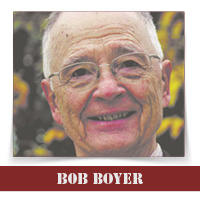By: Bob Boyer
The Philippines hosted U.S. President Barack Obama on April 28 and 29. It was a historic occasion of a sitting American president visiting the Philippines. I am tempted to say that some might complain that it was a long overdue visit, given the mutual history of the two countries, but I am going to emphasize the positives, and, in particular, the humaninterest positives of Mr. Obama’s visit. My source, as it often is for news from the Philippines, is The Philippine Star online edition. Of the many possibilities, I have chosen the following three news stories. 1. Sikatuna. At a special ceremony on Monday, April 28, President Benigno Aquino conferred the highest diplomatic honor of his country on President Obama, the Order of Sikatuna “with the highest rank of Raja.” In his speech, Mr. Aquino referred to the assistance from the U.S. in the disastrous Typhoon Yolanda (Haiyan), to the peace-keeping initiatives of the U.S. in Southeast Asia, and to U.S. aid in “raising the defense capacities of the Philippines.” President Obama gratefully accepted the award and spoke of “the commitment to continue to deepen the bond between our two great nations.” Mr. Obama would, of course, have known that President Eisenhower had been the first to receive this award (1960). The award recognizes the efforts of the recipient to strengthen the relations between the two countries. The typical Filipino moment of the meeting came when President Aquino made the following wish for President Obama’s visit: “Though your stay here in the country may be short, I hope that it will allow you to see and experience for yourself how indeed it is more fun in the Philippines.” The “more fun in the Philippines” is the country’s public relations mantra for tourism. Filipino humor, as with good humor generally, often arises in the midst of solemnity. Mr. Obama, for his part, recognized another characteristic trait of the host country in thanking it for “the extraordinary hospitality during his first visit.” 2. Bayanihan. During their televised press conference on Monday, the two presidents re-affirmed the standing alliance between their countries. Just before his arrival, a new ten-year agreement was signed giving the U.S. additional access to Philippine ports. Mr. Obama made positive points by emphasizing that the new access was not of a permanent nature. There would not be any U.S. bases in the Philippines. Mr. Obama scored further points, I’m sure, by coupling the references to the new ten-year treaty with his comments about continuing assistance for recovery operations from Typhoon Yolanda. “Our commitment to the Philippines will not waver,” he said, good news, indeed, to the many still homeless in the area around Tacloban, where the disaster occurred in November. It was in reference to the typhoon that President Obama used the Filipino term “bayanihan.” “Our partnership reflects an important Filipino concept—bayanihan—the idea that we have to work together to accomplish things that we couldn’t achieve on our own.” Fine words, which, I assumed were suggested to the president by a knowledgeable aid, conversant with this traditional Filipino virtue of helping one another in times of need. Mr. Obama’s source, however, was his wife Michelle, who had first used the term back in November just after the typhoon hit. Now that is quite Filipino, with the woman providing the appropriate language and behavior to her male partner. 3. A Kiss. On Tuesday, April 29, Mr. Obama gave a speech at Fort Bonifacio, honoring the alliance between the U.S. and the Philippines who fought together against the Japanese in World War II. Again, he juxtaposed this past connection with the current alliance to rebuild the devastated area around Tacloban. He also deserves credit for expressing regret that Filipinos who fought with Americans in the U.S. Army in the war were denied their veterans’ benefits. He called it “an injustice.” Important and meaningful words, but perhaps the most significant moment of the speech was when he greeted the handful of Filipino veterans present. These veterans included 94-year-old Carolina Garcia Delfin, a nurse and resistance fighter whom President Obama embraced and kissed. What better way to conclude his visit?## Contact Bob Boyer at Robert.boyer@snc.edu or www.anamericaninmanila.com..
 VIA Times – May 2014 Issue Vital News, Vibrant VIews for Asian Americans in Chicago & Midwest
VIA Times – May 2014 Issue Vital News, Vibrant VIews for Asian Americans in Chicago & Midwest




